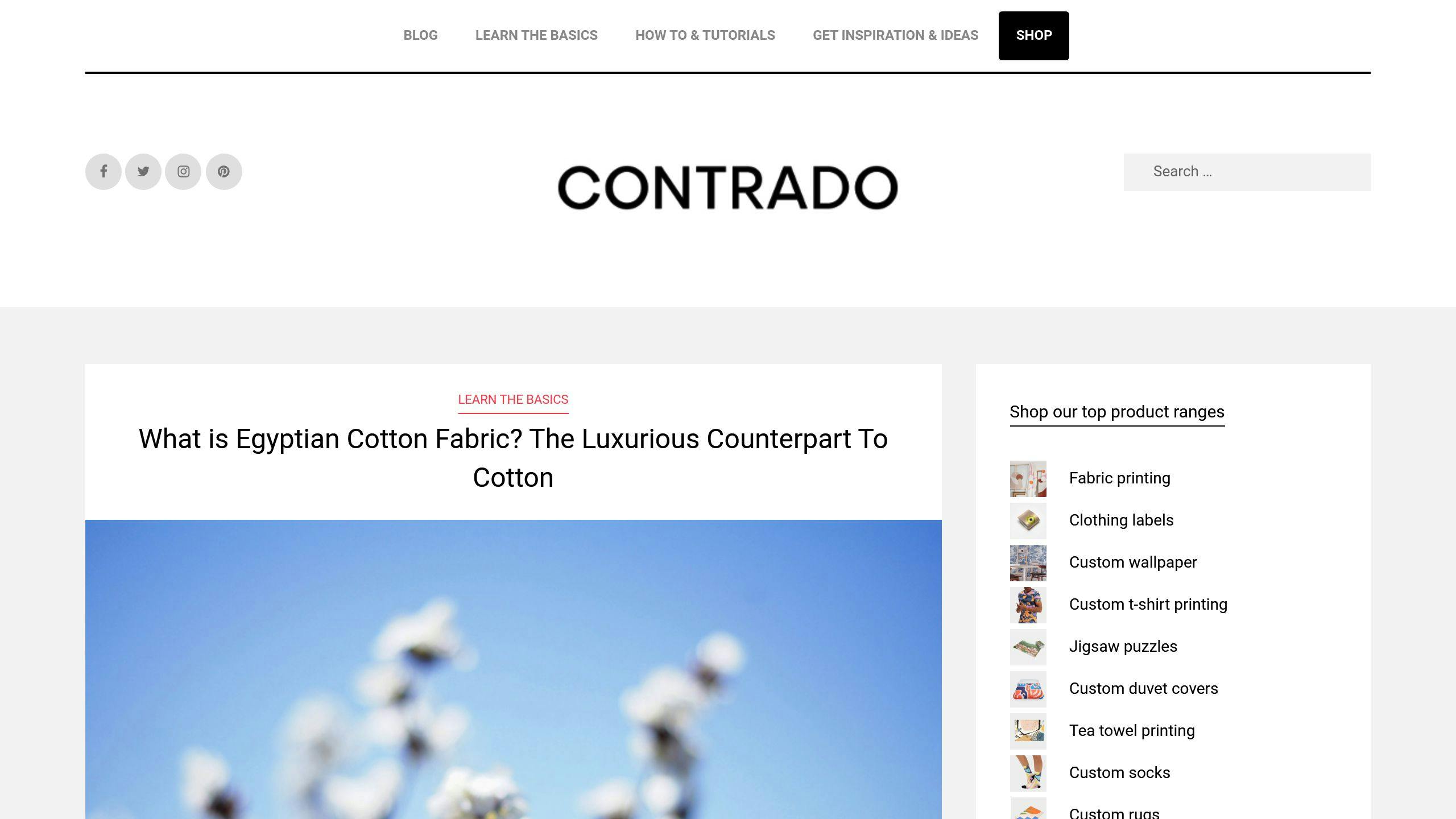Choosing the right sheets can improve sleep quality by keeping you comfortable and cool. This guide compares cotton and bamboo cotton sheets across comfort, breathability, durability, cost, and environmental impact to help you decide.
Quick Comparison
| Feature | Bamboo Cotton Sheets | Cotton Sheets |
|---|---|---|
| Texture | Silky, softer | Crisp, classic softness |
| Temperature Control | Excellent moisture-wicking | Good airflow, depends on weave |
| Durability | Resists pilling and fading | Varies by quality and care |
| Environmental Impact | Low water use, no pesticides | Higher water use, conventional farming |
| Cost | $50-$150 | $20-$50 |
| Maintenance | Gentle care, antimicrobial | Easier care, regular washing |
Key Takeaways:
- For hot sleepers: Bamboo cotton sheets wick moisture and regulate temperature better.
- For sensitive skin: Bamboo cotton sheets are hypoallergenic and antimicrobial.
- For durability: High-quality cotton sheets like Egyptian cotton soften with time and last long.
- For budget-friendly options: Cotton sheets are more affordable upfront.
Choose based on your sleep needs, budget, and care preferences.
Differences Between Cotton and Bamboo Cotton Sheets
Comfort Comparison
Bamboo cotton sheets feel silky and luxurious, offering a softer texture compared to traditional cotton. On the other hand, high-thread-count cotton, such as Egyptian cotton, provides a crisp and classic comfort.
Breathability Comparison
Both options have their own strengths in breathability. Bamboo cotton sheets excel in wicking away moisture and regulating temperature. Meanwhile, cotton sheets, especially those with a percale weave, allow for good airflow [2][3].
Durability Comparison
Bamboo cotton sheets tend to resist pilling and fading, maintaining their quality over time. Cotton sheets, however, vary in durability depending on their quality and how they’re cared for. Properly maintained, both can provide long-lasting comfort and performance [1][3].
Sustainability Comparison
From an environmental perspective, bamboo has an edge over traditional cotton. Bamboo uses less water and doesn’t require pesticides. For those leaning toward cotton, organic cotton is a greener alternative [2][3].
Comparison Table
| Feature | Bamboo Cotton Sheets | Cotton Sheets |
|---|---|---|
| Texture | Silky smooth, softer | Crisp, classic softness |
| Temperature Control | Excellent moisture-wicking, adapts well | Good airflow, depends on weave type |
| Longevity | Resists wear and fading | Varies by quality and care |
| Environmental Impact | Low water use, no pesticides | Higher water use, conventional farming |
| Maintenance | Gentle care, naturally antimicrobial | Easier to care for, regular washing needed |
Both bamboo cotton and cotton sheets bring unique benefits to the table. Bamboo cotton sheets often stand out for their moisture management and durability, while cotton sheets deliver dependable comfort at a more affordable price. Choosing the right option depends on your personal sleep preferences, which we’ll delve into further [1][2].
Choosing Sheets Based on Needs
Sheets for Hot Sleepers
If you tend to overheat at night, bamboo cotton sheets might be your best bet. Thanks to their natural fiber structure, they allow for better airflow, helping you stay cool [4]. Sienna Living offers bamboo sheet sets starting at $126.99, which are especially popular in warm climates due to their moisture-wicking abilities. Plus, with a 120-night trial, you can test how well they perform in various weather conditions. If cooling isn't your top priority, other considerations like skin sensitivity or durability might be more relevant.
Sheets for Sensitive Skin
For those with sensitive skin or allergies, bamboo cotton sheets stand out. Their hypoallergenic and antimicrobial properties help reduce irritation and allergic reactions during sleep [4][5]. This makes them a great choice for anyone dealing with ongoing skin concerns.
Sheets for Durability
When it comes to durability, high-quality cotton sheets - especially Egyptian cotton - are hard to beat. These sheets get softer with every wash without losing their strength [2]. While they might cost more upfront, their long-lasting nature makes them a smart investment over time.
Sheets for Budget-Conscious Buyers
For shoppers on a budget, traditional cotton sheets offer comfort at an affordable price, with options ranging from $20 to $50 [2]. Bamboo cotton sheets, priced between $50 and $150, come with added benefits like durability and health advantages, which can make them worth the extra cost for many.
| Price Range | Material | Long-term Value |
|---|---|---|
| $20-$50 | Cotton | Good durability with proper care |
| $50-$150 | Bamboo Cotton | Longer-lasting with added health benefits |
| $126.99+ | Premium Bamboo-Cotton | Offers multiple benefits and great value |
No matter your budget, the key is to match the sheets' features with your comfort and sleep needs. Even affordable options can make a noticeable difference in your sleep quality.
Bamboo Sheets vs Egyptian Cotton

sbb-itb-a5d8867
Real-Life Performance Examples
Let's dive into how these materials perform in everyday situations, focusing on comfort and care.
Seasonal Temperature Regulation
Bamboo cotton sheets are great for adjusting to seasonal changes. They help you stay cool during hot summers with improved airflow and keep you warm in winter thanks to their breathable fibers [4]. For instance, Sienna Living's bamboo cotton sheets, priced at $126.99, are particularly effective during Australia's fluctuating summer temperatures. On the other hand, traditional cotton sheets, while also breathable, tend to hold onto heat, making them a better fit for moderate climates [1][6].
This makes bamboo cotton sheets a solid option for year-round use. But how do they fare for people with sensitive skin?
Skin Sensitivity and Allergies
If you deal with eczema or allergies, bamboo cotton sheets might be a game-changer. Many users report less irritation due to their hypoallergenic and antimicrobial qualities [1][3]. Plus, their resistance to dust mites creates a cleaner sleep environment, which is especially helpful for those prone to allergies.
Maintenance and Care
When it comes to upkeep, bamboo cotton and traditional cotton sheets each have their own strengths. Here's a quick comparison:
| Aspect | Bamboo Cotton | Traditional Cotton |
|---|---|---|
| Wrinkle Resistance | High | Moderate to Low |
| Color Retention | High | Good |
| Softness Over Time | Stays consistently soft | Gets softer with washing |
Bamboo cotton sheets are less prone to wrinkles and maintain their softness with minimal washing. Traditional cotton sheets, while initially more wrinkle-prone, become softer over time with repeated washes [1][3]. Depending on how much effort you're willing to invest in maintenance, these factors could influence your choice.
Conclusion
Key Points Recap
Bamboo cotton sheets stand out in areas like temperature control and moisture management, making them comfortable throughout the year. Traditional cotton sheets, while breathable, don't offer the same level of performance in these areas [1][4]. In terms of durability, bamboo cotton sheets often last longer, though they come with a higher upfront cost.
Now, let’s break down how to choose the best option based on your needs.
Making a Choice
| Sleep Priority | Recommended Material | Key Benefit |
|---|---|---|
| Temperature Control | Bamboo Cotton | Better moisture-wicking |
| Sensitive Skin | Bamboo Cotton | Gentle on skin |
| Cost-Sensitive Buyers | Traditional Cotton | Lower upfront cost |
| Low Maintenance | Bamboo Cotton | Resists wrinkles better |
If staying cool at night or accommodating sensitive skin is a priority, bamboo cotton sheets are an excellent pick due to their natural cooling and hypoallergenic features [1][2]. On the other hand, if you're budget-conscious and enjoy bedding that softens over time, traditional cotton sheets are a dependable option.
Product Recommendation
For those curious about bamboo cotton sheets, Sienna Living provides high-quality options that combine eco-friendly materials with thoughtful design. Their products make it easy to try bamboo cotton sheets without a big commitment. With proper care, these sheets retain their softness and functionality longer than traditional cotton alternatives [2][3].
FAQs
What is the downside to bamboo sheets?
Bamboo sheets, while popular for their softness and breathability, do have some downsides.
The production process often involves chemicals, which raises concerns for those focused on eco-friendly choices. Additionally, they tend to have a higher upfront cost. However, certifications like Oeko-Tex can help ensure safer production methods, and their long-lasting nature often makes them worth the investment [2].
Here’s a quick look at some common concerns and ways to address them:
| Aspect | Potential Issue | How to Address It |
|---|---|---|
| Manufacturing | Chemical use during production | Opt for options with eco-certifications like Oeko-Tex |
| Care | Requires specific maintenance | Follow care instructions closely |
| Cost | Higher initial expense | Factor in their durability over time |
Choosing bamboo sheets with certifications like Oeko-Tex or GOTS ensures safer and more sustainable manufacturing practices [2]. While traditional cotton sheets may be less expensive upfront and easier to produce, they don’t offer the same unique qualities as bamboo sheets.
Weighing these factors can help you decide if bamboo sheets are the right choice for your needs.

